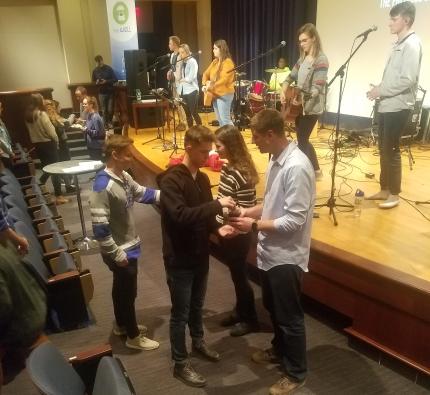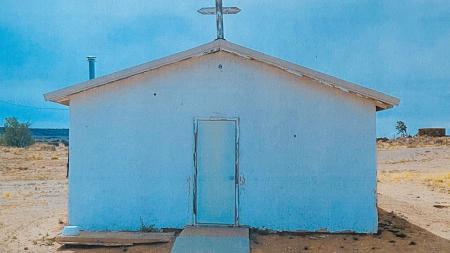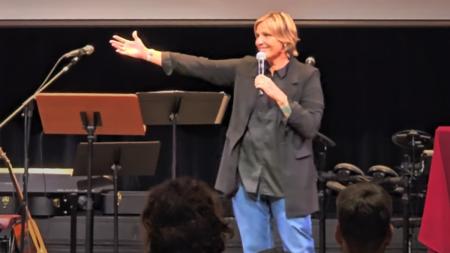Meeting at The Well

Students at The Well come forward for communion.
Chris Meehan
Many of the young people raised their hands or crossed their arms over their hearts as they sang praise songs near the end of the Sunday-night worship service at The Well in Loosemore Auditorium at Grand Valley State University’s downtown campus in Grand Rapids, Mich.
Only a few minutes earlier, these students — several trained to be leaders in what is formally called Campus Ministry@GVSU — had filed to the front of the auditorium to take part in communion. They broke bread and dipped it into grape juice, recalling the death of Jesus Christ who, in the case of several students, is a compelling presence in their lives, largely because of their connection to the campus ministry.
“God is writing an incredible story here at Grand Valley and deeply investing in this generation of students. God wants young people to know and to follow him,” said Scott Stark, director of this campus ministry affiliated with and supported by Resonate Global Mission.
One of the songs the students sang at the close of the Sunday-night service was the Throne Room Song, which begins: “Jesus is in this room./ Here right now, here right now./ Making this place I stand/ Holy ground, holy ground./ Love You, Jesus.”
Being in the room with these young people did feel like standing on holy ground in the presence of Jesus; you could sense their faith overflowing, as if some kind of fresh revival of the Spirit was pouring forth.
Cody Zuiderveen, pastor of the GVSU downtown site for The Well, which is based in nearby Allendale and offers two services on Sunday evenings, agreed, saying something is afoot, bringing new life to this CRC ministry.
“It is clear that the Spirit is moving at Grand Valley and blessing the ministry here in a way that looks like nothing short of a revival,” said Zuiderveen.
“God has opened up lots of doors for ministry on campus, moved the hearts of hundreds of students, and used campus ministry students and leaders to craft a culture that is welcoming, loving, engaging, and challenging.”
This campus ministry is one of more than 35 CRC ministries supported by Resonate on secular campuses across North America. Each of the ministries tends to have its own focus, depending on the context in which they find themselves.
In West Michigan, the focus is on leadership training along with offering small groups, the Sunday-night services, and service-learning opportunities. And for their main goal of developing new leaders they have been working with the help of a $100,000 grant from Lilly Endowment Inc., a private philanthropic foundation in Indianapolis, Ind.
“We believe that training new leaders is key to the future of the church,” said Stark. “These young people are being taught and living out ways in which to do ministry” that can work in today’s fragmented, secular culture.
A Little History Lesson
John De Boer, a CRC chaplain, served as GVSU’s first ordained chaplain in the 1970s. He served there until early 2010, when Stark came. Prior to Grand Valley, Stark had worked in campus ministry at Central Michigan University in Mount Pleasant, Mich.
Also part of the ministry has been an ongoing partnership with the Reformed Church in America for many years. In 2012 the two ministries “more fully aligned our work together on campus,” said Stark. “At that time,” he added, “we decided to take a different approach and to stop the morning service on Sunday, the linchpin of the ministry for more than 30 years, and asked students to attend a local church and to come back in the evening to worship at The Well,” said Stark.
After that change, the numbers of students connected to the campus ministry have grown every year, and now nearly 1,000 students are taking part in some aspect of the ministry. This means that about one in 25 students at GVSU are connected to The Well.
Stark said they have used the Lilly grant, awarded in 2015, to give students a theological framework that they can use in exploring the vocation they hope to choose after college.
In addition, said Stark, they have created many teams, led by student interns, that carry out much of the work of the ministry. For example, some of the teams invite students to become involved in music, productions, hospitality, or addressing global needs.
Another team is made up of students interested in leading a Life Group where participants seek to create a small community in which they discuss the teachings at The Well.
Student Leaders
Emily Goward has led a Life Group and now serves on the hospitality team at The Well downtown. After the recent Sunday-night service, she sat down for a few minutes outside the auditorium as others gathered nearby at a snack table to talk.
“God is very much on the move here,” said Goward, a senior who wants to start a wedding-planning business, using the hospitality skills she’s learned at The Well, after she graduates.
“The Well offers a vibrant sense of community where you can unashamedly be yourself. It is a great place to dive deep, to study, and to ask questions.”
Goward said she grew up in church and her father is a youth pastor, so she came to GVSU looking to join a campus ministry. But that is not the case with many students.
“They don’t know Jesus, but they get hooked into coming to The Well,” she said. And their knowledge of and relationship with Christ changes and grows.
Dawson Rubin, a senior, connected with the campus ministry not long after he came to GVSU from the Chicago area. He also led a Life Group and serves as a Well downtown intern. Wearing a stocking cap over his long hair, he walked up front near the start of the Sunday-night service to give announcements of goings-on at the Well. He also announced two off-campus conference opportunities and a trip to Israel-Palestine.
Joining Goward outside the auditorium after the service, Rubin mentioned that it took some lengthy prodding by his roommate during freshman year to get him to attend a service at The Well in Allendale. Coming from a church background, Rubin said, he thought he would know what to expect. But when he finally relented and went, Rubin realized right away that this wasn’t the type of church he was familiar with.
The music, the prayer, the message, the atmosphere of The Well seemed to be shaped with him in mind, he said — and it was great. It was one of the best worship experiences of his life, he said. He explained that attending church back home more or less gave him a chance to see his friends. But that “wasn’t for the love of Jesus,” he said.
Connecting to The Well, he added, went beyond the Sunday services. Rubin likes sports and has found others from the ministry to play basketball with. When he graduates soon, he plans to work for a nongovernment agency, he said, possibly as a missionary and hopefully in a foreign country. He has gone on several trips with others from The Well to help clean up after hurricanes and do other work, and he has traveled overseas, he said.
Being a leader at The Well and being able to grow in learning theology has helped shape his vocation, said Rubin.
“The Well is cool. We can have regular conversations with each other about sports and other things and learn to love people and accept them for who they are and where they are at,” he said.
A Message about Sin and Grace
At the recent Sunday-evening service, campus pastor Ben Post told a brief story of how he was driving in from Holland for the service that night when a police car came up behind him and followed him for a few miles.
He was relieved when the police cruiser pulled around him and sped off. Post said that experience reminded him of his teenage years when he wasn’t a great driver, got tickets often, and eventually lost his license for a few months. And that, he said, tied into that night’s topic, which was about sin and atoning for it in the Old Testament.
From the rapt look on the 200 or so faces in the audience, Post said, he knew he had most everyone’s attention. A tall, broad-shouldered man, he strode from one side of the platform to the other as he spoke. “There are consequences when we fail, when we mess up,” such as losing your license for getting too many speeding tickets, he said, adding that on a larger scale God also called the Israelites to account for their sin and unfaithfulness.
Post mentioned that God often grew angry at the sins of his chosen people. But God also provided a way out, requiring animal sacrifices for atonement by way of a blood offering — all of which pointed to the ultimate sacrifice that Jesus, God’s only Son, made for the sins of us all. “There are always consequences for what we do,” said Post.
He called two students up to the platform and asked them to roleplay, helping to act out the sacrificial system of the Old Testament. Post used a black gym bag as a symbol of sin in the Old Testament and had brought along a red blanket to throw on it.
After the students took a stuffed animal, a lamb, and pretended to slice its throat with a rubber knife, they set it on the stage, and Post placed the blanket over it.
“We see how we only covered up our sin in the Old Testament, but it is much different in the New Testament,” he said.
After the death of Jesus, our sins are forgiven. No blood sacrifice was necessary anymore on the part of the people. As the students listened closely, Post added: “Our sins are paid for. Jesus brought us back into life.”
Boiling it down, Post said, “God is holy and wants his people to reflect his holiness. . . . God doesn’t want us to sin. And when we sin yet today, there are consequences — but God is there to always bring life out of life, to help us be holy and turn our attention to him.”
For more information on CRC campus ministries in North America, see Resonate’s campus ministry website.


